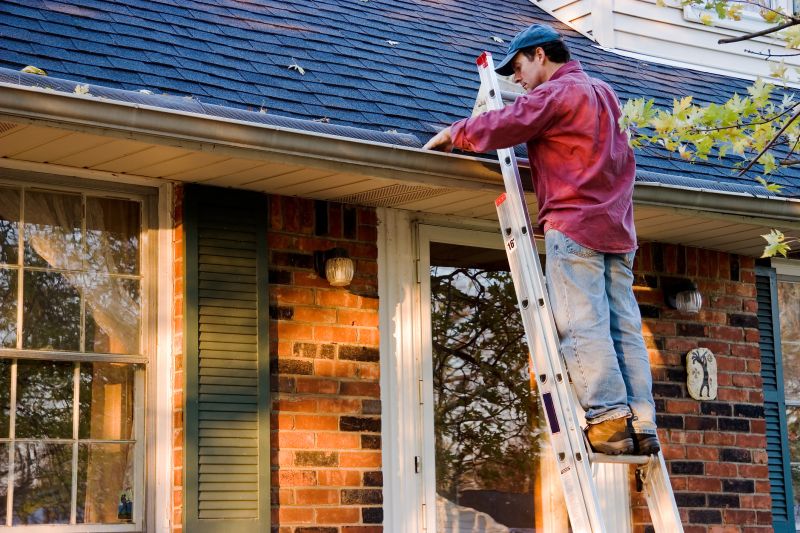Top-Rated Gutter Cover Products for Service Professionals
Compare the most sought-after gutter covers that service providers rely on for effective gutter maintenance.
 Gutter covers are essential components for maintaining the integrity and functionality of your home's gutter system. They serve as protective barriers that prevent leaves, twigs, dirt, and other debris from clogging gutters and downspouts. Properly selected gutter covers can reduce the frequency of gutter cleaning, minimize water overflow during heavy rains, and help prevent pest infestations that often occur in clogged gutters. In Black Mountain, NC, where seasonal foliage can be quite dense, choosing the right gutter cover system is particularly important to ensure effective drainage and to protect your home's foundation and landscaping.
Gutter covers are essential components for maintaining the integrity and functionality of your home's gutter system. They serve as protective barriers that prevent leaves, twigs, dirt, and other debris from clogging gutters and downspouts. Properly selected gutter covers can reduce the frequency of gutter cleaning, minimize water overflow during heavy rains, and help prevent pest infestations that often occur in clogged gutters. In Black Mountain, NC, where seasonal foliage can be quite dense, choosing the right gutter cover system is particularly important to ensure effective drainage and to protect your home's foundation and landscaping.
Top Overall Option
Versatile Gutter Cover System
A well-designed gutter cover system that combines durability, ease of installation, and effective debris prevention. It features a mesh or screen top with a sturdy frame, suitable for a variety of roof types and weather conditions. This system is often appreciated for its low maintenance requirements and compatibility with existing gutters, making it a popular choice for homeowners seeking reliable protection.
Types of Products For Gutter Covers Service
Mesh Gutter Screens
Wire or plastic mesh covers that prevent debris from entering gutters while allowing water to flow freely.
Reverse Curve Gutter Guards
Designs that direct water over the edge into the gutter, blocking debris with a curved surface.
Foam Gutter Inserts
Foam blocks that fit inside the gutter, filtering debris while letting water pass through.
Brush Gutter Guards
Bristle-style covers that trap debris on the surface while allowing water to flow beneath.
Surface Tension Gutter Guards
Designs that use surface tension to direct water into the gutter while keeping debris out.
Micro-Mesh Gutter Guards
Fine mesh screens capable of filtering small debris and preventing clogging.
Perforated Metal Gutter Covers
Metal covers with small holes that allow water through while blocking larger debris.
Snap-In Gutter Guards
Easy-to-install covers that snap into place on existing gutters, often made of plastic or metal.
Magnetic Gutter Covers
Covers that utilize magnets for easy installation and removal, often combined with mesh or foam.
Expandable Gutter Guards
Flexible covers that can be adjusted to fit various gutter sizes and shapes.
Perforated Plastic Gutter Covers
Lightweight plastic covers with perforations to allow water flow and debris prevention.
Aluminum Gutter Covers
Durable aluminum guards that resist rust and weathering, suitable for long-term use.
Popular Choices
Widely used for their straightforward design and maintenance ease, mesh screens are favored by many homeowners.
Popular for their effective debris blocking and water directing capabilities, especially in heavy rainfall areas.
A common choice for quick installation and minimal upkeep, fitting inside existing gutters.
Valued for their simple design, these guards are often chosen for their affordability and ease of installation.
Preferred for filtering small debris and preventing clogging, suitable for areas with dense foliage.
Selected for their durability and effectiveness across different weather conditions.
Popular due to their ease of installation and removal, making maintenance straightforward.
Chosen for their longevity and resistance to rust, suitable for year-round exposure.
Often used in regions with heavy rain, these designs help manage water flow efficiently.
A lightweight option that balances cost and performance for many homeowners.
There are various types of gutter covers available, each designed to suit different needs and preferences. Mesh screens are popular for their simple installation and maintenance, allowing water to flow freely while blocking larger debris. Reverse curve systems guide water over the edge into the gutter while keeping debris out, though they may require professional installation for optimal performance. Foam inserts fit inside the gutter and act as a filter, trapping debris while permitting water flow. Each type offers unique benefits and considerations, making it essential to evaluate your specific situation, roof type, and local climate conditions.
Installation methods can range from DIY-friendly snap-in or peel-and-stick options to more complex systems that might require professional setup. Durability and material quality are also crucial factors, as gutter covers are exposed to weather elements year-round. Materials such as aluminum, stainless steel, or durable plastics are common choices, each with its own lifespan and maintenance requirements. When selecting gutter covers, it’s important to consider compatibility with your existing gutter system, ease of cleaning, and whether the system can handle heavy rainfall typical of North Carolina's weather patterns. Properly chosen gutter covers can contribute significantly to the longevity and performance of your gutter system, ultimately protecting your home’s structure and landscape.
Key Buying Considerations
- Compatibility with existing gutter system and roof type
- Material durability and resistance to weather elements
- Ease of installation, whether DIY or professional service required
- Maintenance requirements and cleaning frequency
- Ability to handle heavy rainfall or storm conditions
- Size and fit for your specific gutter dimensions
- Design aesthetics and how well it integrates with your home exterior
- Cost and long-term value relative to features and lifespan
- Effectiveness in blocking debris without impeding water flow
- Warranty or guarantee offered by the manufacturer
- Resistance to pests and nesting opportunities
- Material weight and ease of handling during installation
- Availability of replacement parts or panels
- Local climate considerations and seasonal weather patterns
- Compliance with local building codes or homeowner association rules
